Fair Trade Certification for Producers: Farms, Fisheries, and Factories
Unlock the Power of Fair Trade
Welcome to a more responsible, sustainable way of doing business. Here’s how becoming a Fair Trade Certified™ producer can benefit you and your community:




Fair Trade Certification Overview
Here is a simplified overview of the steps needed to become a Fair Trade Certified producer.
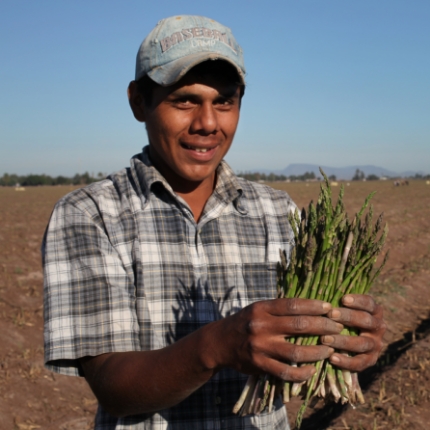
1. Get in touch with our team
Fill out this quick form for a no-obligation conversation about what it takes to get certified.
2. Create your Certification Plan
We’ll work closely with your team to assess your business needs and identify a plan to achieve certification.
3. Begin the audit process
We’ll work with your team to formally begin the audit process. Once you meet requirements, certification is awarded.
Already Fairtrade International–Certified? Expand your market access with Fair Trade USA.
Fair Trade USA’s Recognition Program accepts Fairtrade International certification as equivalent to its own. This means Fairtrade International–certified producer organizations can be officially authorized to trade within Fair Trade USA supply chains without needing an additional audit.
Learn more about the benefits of the program, including how it works, what is required to participate, and how it can help grow your business and impact.
The focal areas that guide our standards
The Fair Trade standards cover four focal areas to support producers, farmers, workers, and fishers:
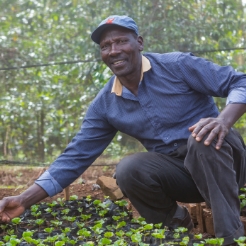
Worker Voice
Tools, training, and processes are put in place for farmers, workers, and fishers to work and partner with management to improve working conditions, and supply chain partners to improve terms of trade. Systems are put in place to create and/or enhance communication mechanism.
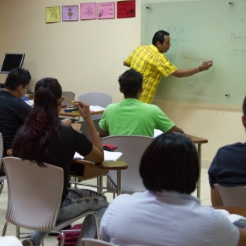
Economic Development
A key benefit of Fair Trade for producers is that farmers, workers, and fishers earn Community Development Funds. These funds are paid by buyers and managed by a democratically-elected Fair Trade Committee that decides collectively how to invest in their community.

Social Responsibility
Farms, factories, or fisheries commit to protect fundamental human rights and follow internationally-recognized labor standards and employment conditions. Health and safety practices are implemented to avoid work-related injuries.
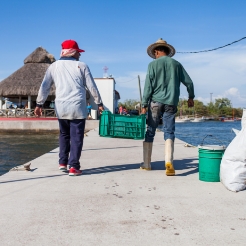
Environmental Responsibility & Management
Good production practices must be implemented to promote responsible environmental management. Production resources are protected, and impacts from waste, water use, and chemicals minimized.
How We Work
From certification to consumer purchase and reinvestment, our model is a virtuous cycle that ultimately improves the lives of workers, farmers, fishers, and their communities.
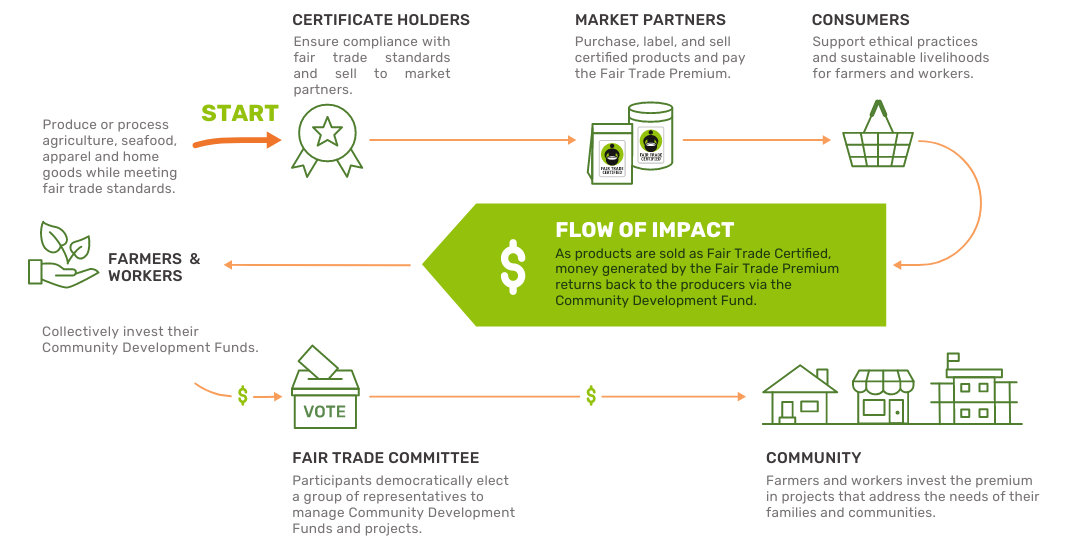
Frequently Asked Questions
What are the standards I will be expected to meet?
We have specific standards for farms, fisheries, and apparel and home goods factories. Please see our list of producer and trade standards for more information.
Who can earn Fair Trade Certification?
Fair Trade USA certifies producers and groups of producers of all sizes, including farms, fisheries, and factories.
What Fair Trade Certified goods are traders looking to source from producers like me?
Apparel, body care, grains, herbs and spices, home goods, honey, cocoa, coconut, coffee, flowers, fresh produce, seafood, spirits, sugar, tea, wine, and more can be Fair Trade Certified.
What if my product does not fall into one of those categories?
Please contact us by filling out a form on our Get Started page so we can explore if certification makes sense for your product.
What is minimum price setting? Does it apply to me?
Fluctuations in world market prices hit workers and farmers the hardest, so some Fair Trade Certified products have a set Fair Trade Minimum Price (see our Prices and Premiums Search page for more details). This serves as a safety net for producers in particularly volatile markets when prices dip too low and creates real opportunities for improved livelihoods.
What is the Fair Trade Premium? Does it apply to me?
For every Fair Trade Certified product sold, a business or importer pays a Fair Trade Premium that goes into a worker-controlled Community Development Fund at origin. From there, a Fair Trade Committee, which consists of workers, farmers, and/or fishers responsible for the product, decides together how to spend the funds to improve their lives and meet their unique individual and collective needs, as well as the needs of their communities and environments.
To look up the premium amount for a particular product, see our Prices and Premiums Search page.
What is a Fair Trade Committee?
A Fair Trade Committee consists of a group of producers, workers, farmers, and fishers that foster communication and collaboration on important issues such as health and safety and community investments. Their main responsibility is to manage the use of the Fair Trade Community Development Fund. These projects are determined through a Needs Assessment (a framework that helps Fair Trade Committees determine how to scope and establish projects). You can learn more about the Needs Assessment process here.
Do you accept FLO-CERT certification?
Yes. Fair Trade USA understands that producers have worked hard to achieve these certificates, so we honor most FLO-CERT certifications. Learn more about the Fair Trade USA Recognition Program for Fairtrade International-certified producers.
Do I have to meet all the requirements at once?
No. The process of getting certified is a journey of continuous improvement, but there are minimum requirements that must be met prior to certification. Visit our Standards page to learn more.
How do I maintain certification?
Maintaining certification means complying with the standard minimum requirements and increasing compliance each year to ultimately meet full requirements. This will be verified by passing an audit each year. Audits are performed by one of these auditing firms: SCS Global Services, Control Union Services S.A.C, Oregon Tilth, ARCHE Advisors, TAOS Network, or ELEVATE Limited.
Where can I get more information?
For a more in-depth picture of how Fair Trade works, visit our How We Work page. You can also visit Our Impact page.
I'm interested in partnering with Fair Trade USA. Where do I start?
Please visit our Get Started page and fill out the “Producer” form.
Resources
Overview of our Standards
Here’s what our certification scope and compliance criteria look like.
Reporting a complaint or issue
Do you want to report an issue or understand how we handle complaints? Learn more here.
Ready to learn more about Fair Trade Certification?
Fill out this simple form and we will respond to you.